The following article aligns with our discussion of using AI technology to create deep fakes. However, this article identifies an experiment conducted by a group of University of Chicago researchers. The experiment involves using computer algorithms to create fake Yelp restaurant evaluations. The researchers used a machine-learning technique known as deep learning to analyze letter and word patterns used in millions of existing Yelp reviews. Usually when there are mass postings of fake reviews, for example when Hilary Clinton’s book was launched, websites are able to identify it. However, with the researchers’ use of AI, Yelp’s filtering software had difficulty spotting many of the fakes. Even human test subjects were unable to tell the difference between real and fake reviews.
The researchers wanted to conduct this experiment in order to see whether it was possible for individuals to make fake reviews on a mass level in order to impact people’s use of a product, book, restaurant or anything else. This interest displays how things focused on in the media like “fake news” or “deep fakes” really can impact the research and developments in the communication field.
For now, the approach to create fake critics remains to be “crowdturfing” where mass amounts of people are paid to comment on websites. “In crowdturfing online reviews, an attacker creates a project on the Mechanical Turk site and offers to pay large numbers of people to set up accounts on Amazon, Yelp, TripAdvisor or other sites and to then post reviews intended to either raise or sink a product or service’s money-making prospects”.
From here the researchers plan on looking at ways to detect fake news – currently its difficult to create fake news with AI because computers cannot generate the “human touch” in articles however if AI can create fake reviews – anything is possible.
ARTICLE: https://www.scientificamerican.com/article/could-ai-be-the-future-of-fake-news-and-product-reviews/
Read More | No Comments
This article was interesting in light of what we’ve been discussing in class:
https://www.thestar.com/news/canada/2018/02/08/trudeau-to-facebook-fix-your-fake-news-problem-or-else.html
The article is just quoting “a source with knowledge” of some conversation between Trudeau and Sheryl Sandberg, and then goes on to say that neither Facebook or the PM’s office would comment on this, but putting aside the irony of an article about fake news that is essentially based on one anonymous source, it seems that the highest levels of Canadian government are at least considering some kind of social media regulation.
I also thought it was interesting that the title of the article references “stricter regulation” even though there doesn’t seem to be any sort of Canadian government regulation of Facebook at this point, particularly in regards to the kind of news content it allows on the site, and the article doesn’t go on to explain what, if anything, it is referencing with that wording in the title. It may have just been an oversight/error, or maybe they were thinking of regulations in a much broader sense, beyond the scope of communications law and site content, but it could also be that people just sometimes assume that there is some kind of regulation in place already in these situations, because it seems to strange to think that there wouldn’t be anything stopping these social media giants from profiting by basically turning a blind eye to propaganda.
Read More | No Comments
Here they are in their sum total…
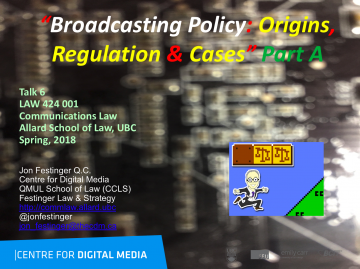
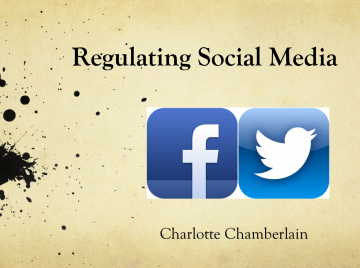
Jon
Read More | No Comments
In response to a recent post by Stephanie concerning findings on mobile carriers stifling certain apps and content, I am posting an article I recently read concerning Facebook and Google’s dominance on Ads. More often than not one will be searching something on googling and on Facebook an advertisement referring to the searched item will be present. The ability for Google and Facebook to do this is purely genius on their part and it connects back to the discussion we had on the ability for companies to increase their revenue by using their own users for feedback on what they want to watch/see and in this case assisting other companies to capitalize on that with ad space on these websites. Last year alone Google garnered (including YouTube) garnered $35.00 billion in total digital ad dollars in the US, up 18.9% over 2016!
AND if you are really paranoid about Facebook’s ability to look at your previous searches and reflect that in advertisements on their site ( EVEN THOUGH THEY ALLEGEDLY DENY DOING THIS) , the below article gives you a step by step guide on how to eliminate their ability to do this – logging out is not enough and there is no way to complete eliminate it but there are steps you can take to protect yourself.
https://lifehacker.com/5843969/facebook-is-tracking-your-every-move-on-the-web-heres-how-to-stop-it
Other articles:
Check out this article for more stats: https://www.emarketer.com/Article/Google-Facebook-Tighten-Grip-on-US-Digital-Ad-Market/1016494
This article… https://www.cnbc.com/2018/01/04/cowen-facebook-vs-google-digital-ad-business.html also addresses Google’s leadership in digital Ads but it was stated last month that Facebook is expected to increase its share thanks to the growth of Instagram and video ads.
Read More | 1 Comment
Tomorrow I will talk in my class presentation about whether and how social media should be regulated. Some of the most important concerns in this area revolve around the issues of free speech, democracy and censorship. A number of European countries have debated and enacted certain provisions which go some way to ‘regulating’ or ‘censoring’ social media posts. Have a read of these 2 articles (one about Ireland and one about Germany); they serve as interesting comparisons to the legal landscape in Canada. The core of the presentation tomorrow will consider whether it is appropriate for governments or for individual social media companies to decide what may and may not be posted on social media platforms, or whether there might be an alternative and/or hybrid route to answering this difficult question.
A social media watchdog in Ireland? https://www.siliconrepublic.com/enterprise/digital-safety-commissioner-social-media-watchdog-ireland
Censorship in Germany? https://www.bloomberg.com/view/articles/2018-01-03/welcome-to-2018-the-year-of-censored-social-media
Read More | No Comments
Stumbled across this article regarding a new app that analyzes data on how mobile carriers stifle certain apps/content/etc. An interesting read and video!
https://news.vice.com/en_ca/article/8xd4dg/are-mobile-carriers-already-violating-net-neutrality
Read More | 1 Comment
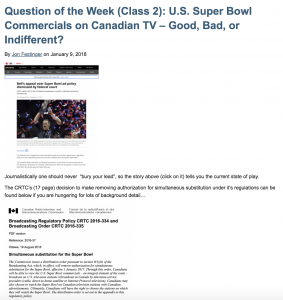

The background for this week’s “all in one” question of the week has previously been set out in the posts above.
Additions of note are that the CRTC issued a guide to watch the Super bowl this past Thursday February 1, 2018; a TorStar from the following day reporting on the current state of affairs; and an article in Macleans warning Canadians to get your U.S. Super Bowl commercials on canadian TV this year as they may not be available this time next year. You’ll find them below…

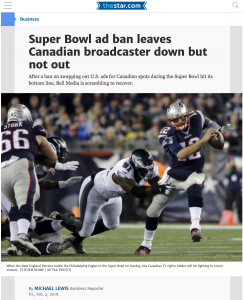

After all that the question itself is relatively straightforward….
Sorry, there are no polls available at the moment.
We can parse the results in class. By that time ratings and more data should be available.
As an added bonus, check out the Wired article below that combines the Super Bowl with aspects of the futurist exercise we did in class.

Jon
Read More | 2 Comments
Slides from today can be found here, with a few additions.As promised I’ve added some slides on the Sega TV saga – the game download service from 1995 that the CRTC considered licensing. As well, in the context of the Hush-A-Phone device that arguably laid the groundwork for breaking up the Bell monopoly in the U.S., I’ve added a slide that takes you to the “Cone of Silence” gag in the original “Get Smart” TV series.
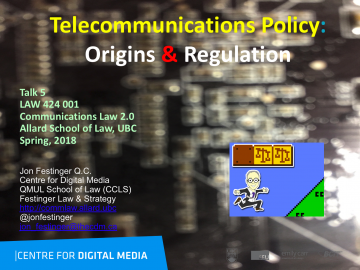
Jon
Read More | No Comments










 Communications Law
Communications Law